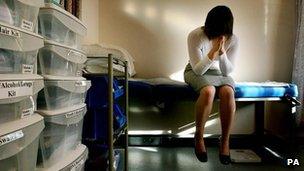Rape Crisis reports 40% rise in calls since Savile scandal
- Published

Katie Russell from Rape Crisis said sexual violence happened "a lot more" than people think
A charity for abused women and girls says it has seen a 40% rise in calls in the year since the first Jimmy Savile sex abuse claims emerged.
Rape Crisis England and Wales said its national helpline had received 78,000 calls in the 12 months to October, compared with 55,000 the previous year.
Local centres had also seen an increase in the use of their services, it said.
Allegations about the former BBC DJ Savile were first aired in an ITV documentary on 2 October 2012.
The rise in the number of those coming forward over abuse reflects similar trends recently reported by children's charity the NSPCC and in police statistics obtained by BBC Radio 5 live.
'Vital' services
Savile, who died in 2011 aged 84, was a Radio 1 DJ and the presenter of the Jim'll Fix It show on BBC One.
The ITV documentary Exposure: The Other Side Of Jimmy Savile featured the accounts of five women who said they had been assaulted by Savile.
The allegations prompted a joint investigation by children's charity the NSPCC and the Metropolitan Police into claims the late presenter had sexually abused women, girls and boys.
Detectives later said they had recorded 214 sexual offences - including 34 rapes - against Savile's name. They said the offences took place throughout the UK between 1955 and 2009.
Rape Crisis spokeswoman Katie Russell said: "Shocking as the revelations of the last year have been, they've reinforced what we within the Rape Crisis movement have learnt through our 40 years' experience of providing specialist support to women and girls - that sexual violence sadly happens a lot more than most people think, and that the impacts for the survivor can be devastating and lifelong."
She went on: "We know from this frontline work how difficult it can be for those raped and sexually abused as children to seek help at the time.
"This is reflected in the fact that 450 survivors have reported Savile since his death, while only four felt able to during his lifetime.
"This is one among many reasons why our services and their continuation are so vital."
- Published31 August 2013
- Published1 July 2013
- Published4 February 2013
- Published14 December 2012